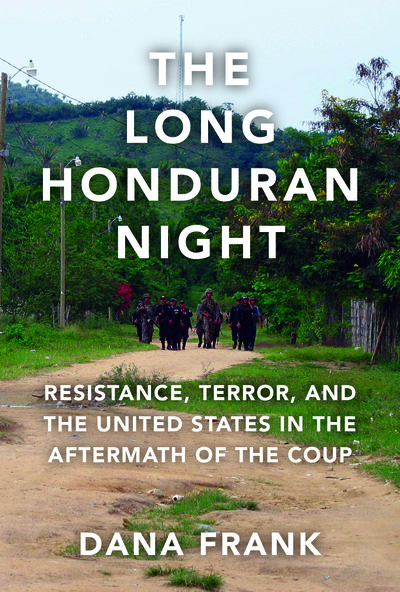Campus News
New book by Dana Frank tells personal story of resistance, terror, and U.S. policy in Honduras
“The Long Honduran Night” is the latest book by UC Santa Cruz emerita professor of history, Dana Frank. One of the top academic experts on Honduras in the United States, she tells the dramatic story of life in that country after the military coup that ousted President Manuel Zelaya in June 2009.



The Long Honduran Night is the latest book by UC Santa Cruz emerita professor of history, Dana Frank. One of the top academic experts on Honduras in the United States, she tells the dramatic story of life in that country after the military coup that ousted President Manuel Zelaya in June 2009.
Told in part through first-person experiences, interwoven with lucid political analysis, it is a story about the repressive regime that was launched with the coup, the ways in which U.S. policy has continued to support that regime, and the Honduran resistance movement that is growing with help from a new solidarity movement in the United States.
“The book is about one-third my personal stories of what I witnessed, and was eventually involved in, during the nine years following the coup that deposed the democratically-elected president of Honduras.,” said Frank. “It’s not just a horror story, though. It deliberately tries to balance the story of repression with the joys and commitments of the Honduran resistance, and how Hondurans continue to seize life amidst terror.”
“The book is very deliberately transnational–crossing back and forth between Honduras and Washington D.C.,” Frank added. “And it very deliberately counters the mainstream media narrative about Honduras, which casts Hondurans as merely suffering victims with no political movements or opinions.”
Tracking U.S. policy as it developed year by year after the coup, the book shows how that policy has been instrumental in supporting a brutal regime for a decade and helping to create some of our most pressing problems today–including the so-called border crisis. By 2012, Honduras had the highest homicide rate in the world with 86 murders per 100,000 residents. The victims have included journalists, union leaders, human rights defenders, as well as leaders of poor farming communities.
“President Trump and his allies have called it a border ‘crisis’ to fan the flames of racism and immigrant-bashing,” said Frank. “But for Hondurans, and other Central Americans, the crisis in their own countries is very real. Mainstream media coverage tells us that Hondurans are fleeing ‘violence and poverty’ but misses the glaring fact that the violence and poverty are the direct result of U.S. policy–which has been, and remains, providing support for the vicious post-coup regime, and especially the dictatorship of Juan Orlando Hernández.”
“U.S. funds continue to shore up his police and military, which continue to use live bullets to kill peaceful protesters,” she added. “And a great range of growing evidence documents that the Honduran military, police, and president are involved in drug trafficking–yet the U.S. continues to celebrate its partnership with Honduras in fighting drug trafficking!”
Frank has been commenting on the volatile situation in the region since the 2009 military coup for media ranging from the New York Times and Washington Post to National Public Radio, and the Associated Press. She has consistently questioned U.S. foreign policy toward Honduras in an effort to stop the administration from supporting, funding, and perpetuating human rights abuses.
She has also testified in Congress about Honduras, as well as in the California State Assembly about the treatment of refugees from Central America.
In a 2013 appearance before the Tom Lantos Human Rights Commission in the U.S. House of Representatives, Frank began her testimony by noting:
“I have been asked to address U.S. policy in Honduras, and that will be the focus of my statement here today…Before doing so I would like to reiterate the enormity and breadth of the human rights crisis the other speakers have identified.
I just returned from Honduras yesterday. When I arrived a few days before, I spoke with a young father in his early 30s. He is not particularly involved politically, but quite well-informed. When I told him I was going to testify in the U.S. Congress about human rights in Honduras, he volunteered–without any further words on my part: ‘There are no human rights in Honduras. ‘They don’t exist.’”
Frank has spent the last few months doing numerous interviews for her new book in a variety of media venues, while still being tapped by reporters from major news outlets for comments on current events such as the recent migrant caravans.
“When journalists contact me, it’s usually about breaking news—such as when the Honduran dictator, Juan Orlando Hernández, stole the 2017 presidential election and turned the police and military on protesters,” said Frank. “In other cases, it’s investigative journalists, who are looking for insights into a specific dynamic, as when the Associated Press documented that the National Director of Police had been moving cocaine.”
But she also continues to travel to Honduras and Washington D.C. in her decade-long effort to help change U.S. policy toward Honduras. And her message is loud and clear.
“The U.S. should immediately suspend all security aid to Honduras, and stop treating the narco-dictatorship as a friendly partner,” said Frank. “’Humanitarian’ or ‘development’ aid should be carefully evaluated too. USAID funds have a long history of being used to create and nurture fake ‘civil society’ groups loyal to the U.S. and designed to serve U.S. interests. Agricultural ‘aid’ has long been used to create export and import dependencies. All this aid is called ‘soft power’ for a reason.”
“We need, instead, to listen to what the independent social movements and human rights groups in Honduras have to say–to their own ideas about democracy, free and fair elections, and social justice–rather than deploy new forms of imperialism in the name of ‘helping’ poor victims.”